It’s Been Grand: Opry Prepares to Celebrate 5,000 Saturday Night Broadcasts From Nashville

“I grew up remembering when a sitcom would celebrate 100 episodes, and they’d wheel out the cake,” says Dan Rogers. For the Grand Ole Opry, which he serves as executive producer, they’re gonna need a bigger bakery. The weekly Nashville-based show, which has been a radio program since 1925 and a TV series on and off for many of those years, is about to have its 5000th weekly Saturday night broadcast on Oct. 30. Eat your heart out, “NCIS,” “Simpsons,” “Gunsmoke,” “Meet the Press,” “General Hospital,” et al. — there’s an old kid in town.
“It’s unprecedented, and you’ll probably never see it again, especially with a radio show,” Rogers says. “Five thousand Saturday nights is astounding when you begin to think about each of those Saturday nights and what was happening on those Saturday nights — civil unrest, World War II, the Depression. But even the past 80… you know, think what we’ve been through just since March of 2020.” Only once in history was the Opry’s live broadcast canceled, when a curfew was imposed following the assassination of Martin Luther King Jr. in 1968. Quarantining was not about to cause a second cancellation; the Opry carried on as lockdown kicked in by broadcasting acoustic performances with stars placed apart on stools, no live audience and skeleton crews, so the circle could remain unbroken.
More from Variety
Ralph Emery, TV Host Known as 'the Johnny Carson of Country Music,' Dies at 88
Jeannie Seely, a Reigning Queen of Old-School Country, Has One Word for the Grand Ole Opry: 'Yes'
The Oct. 30 lineup will span generations, with performers who made their first impact in the 1960s (Bill Anderson, Jeannie Seely, Connie Smith), ‘70s (the Gatlin Brothers), ‘80s (Vince Gill, Garth Brooks), ‘90s (Trisha Yearwood, Terri Clark), 2000s (Darius Rucker, as a solo artist, and Chris Young) and 2010s (Chris Janson). But then, the Opry does that every week, carefully mixing legacy artists who go back decades with newcomers who just released their first singles. “It’s not just generational, of course, either,” says Rogers. “What really makes the Opry tick is about giving people a little sample of as much as we can under the country umbrella.” On the weekly show, perhaps more so than in this superstar-filled special, “it’s a mix of musical styles, so you have Americana, bluegrass, comedy, classic country, contemporary country, and Western all in one hopefully tremendous show.”
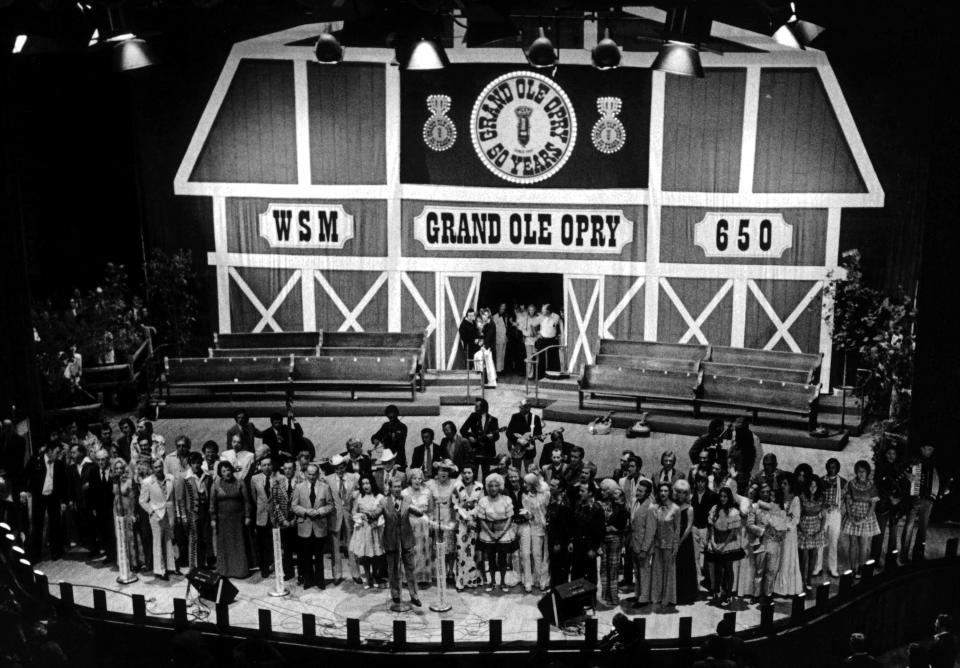
Courtesy Grand Ole Opry
One thing that may be misleading about the 5,000 figure is that it only counts the weekly Saturday broadcasts, not the number of actual live Opry shows — which keeps expanding exponentially, now that there are a minimum of three nights at the Opry in a week and sometimes as many as five. Scott Bailey, the president of Ryman Hospitality Properties’ Opry Entertainment Division, says they do 230-240 shows on an annual basis now. That’s partly due to Nashville’s booming tourism and convention business. Sixteen million tourists visit Tennessee every year, and the Opry is the No. 1 state tourist attraction, so the Opry House can only stay dark so many nights. (There are new wrinkles yet to be tried: Later this year, they’re going to experiment for the first time with a handful of all-Christmas weeknight shows, educating attendees about the holiday chestnuts most people wouldn’t know were written and recorded in Nashville.)
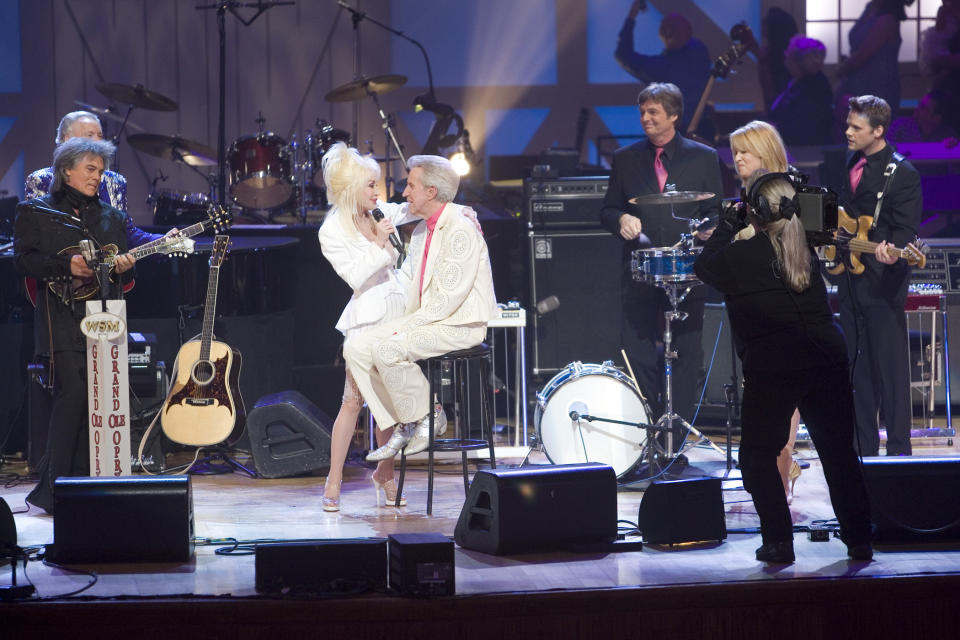
Hollo Photographics, Inc.
There’s a curious symbiosis that happened when Opry Entertainment, in conjunction with Gray Television, launched a new TV network, Circle, centered around Opry broadcasts — in February 2020, of all times. “I’m not sure that launching a television network on a streaming platform would have been the best idea during a pandemic, but ironically it had the opposite effect than I would’ve thought,” Bailey said. “There was no other live programming that was out there. And we had just put the Opry on some platforms where new, younger consumers are finding themselves.” That included newer streamers like Peacock and Roku but is now also expanding to cable and satellite platforms like Dish and Charter. With patrons now back in the seats, it’s hard to know which experience of the Opry is boosting which more, since, as Bailey says, “we wanted to make sure that we were beginning to influence (streaming) consumers to come in and see the actual product live.”
Rogers realized that the Opry was a lifeline for some during the pandemic, for fans craving anything musical, intimate and professional happening in real time. “You can go back and look at the comments: People were saying, ‘We set our alarm clocks’ — halfway around the world! — ‘to get up and watch.’ And they could have watched it the next day when they woke up, but they wanted that connection with live, with Nashville, Tennessee.” You could almost picture 1930s Opry listeners gathered around the radio, looking for a cure for pandemic depression, not the Depression.
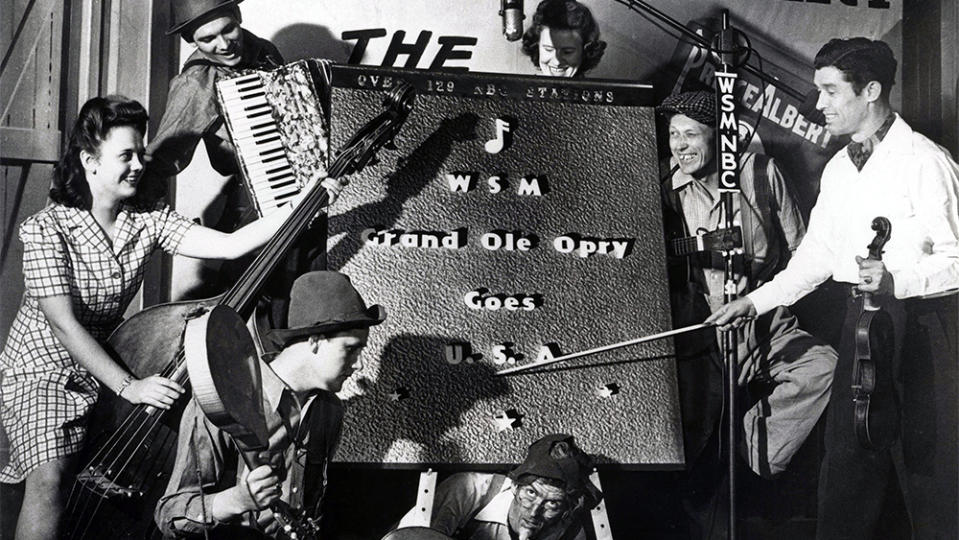
Courtesy of Grand Ole Opry Collection
The Opry has proven so savvy in appealing to modern country audiences while making tradition a big part of the draw that it’s hard to imagine anything at present that’d be a roadblock on the way to, say… 10,000 episodes? “The heart of the Opry is still the artists who come and play here and their connection to the fans who either tune in or come to see them,” says Rogers. “And if it makes it to 10,000, that will still hold true.” Rogers laughs. “I won’t be here for that. But if I had the choice, I think I would be.”
Rogers points to a placard outside his office door counting down the days to Oct. 30. “I literally cannot go to the bathroom without being reminded how few days we have left before the show — in the middle of everything else that’s happening, just trying to work through pandemic-related things.” Yet he admits he’s thinking beyond this particular milestone, to the next. “We’ll celebrate 5,000 Saturday night broadcasts, and then everything we’re doing from there forward will be about making sure that this show is in the best place it can be to mark its 100th anniversary in 2025. It’s crazy to be in a job where you talk about setting things up as a springboard for the next century.”
Variety visited the Grand Ole Opry recently and sat with three of the performers that returning audiences most look forward to: Ashley McBryde, Mandy Barnett and true Opry veteran Jeannie Seely.
Ashley McBryde Shares (Minnie) Pearls of Wisdom About Her Grand Ole Opry Rituals
If there’s anything you could bet on in country music, it’s that Ashley McBryde is a future Grand Ole Opry member… and probably, much further down the line, a Country Hall of Famer, too. But she hasn’t been at it for that long, in the historical scheme of things. Ask her if she remembers her first Opry appearance, and it pops out immediately: “Absolutely! June 16th, 2017. We did my makeup probably four times that day because I kept crying. I cried when I got to room four, because I knew about room four before I walked into it.”
What’s room four? It’s the dressing room reserved exclusively for first-timers. “You’re terrified, but I was constantly hearing, ‘Hi Ashley. We’re so glad you’re here.’ And I knew that this would be the only time I get to stand in this room, but what I didn’t know until I walked in was what the contents of the room are, and it’s pictures of different people — you’ve got Carrie Underwood and Darius Rucker and Taylor Swift and Alan Jackson making their Opry debuts. From them. So you, you feel like the Opry puts its arms around you immediately. Then you don’t get to go back and room four and use it as a dressing room. The only time you’ll go back is to congratulate somebody else on their debut. And I’ve done that, but I won’t even go in past the threshold. I just stick my head and say ‘I want to congratulate you on your debut.’ I’m not going to go back in because it keeps it sacred. We have so few things like that.”
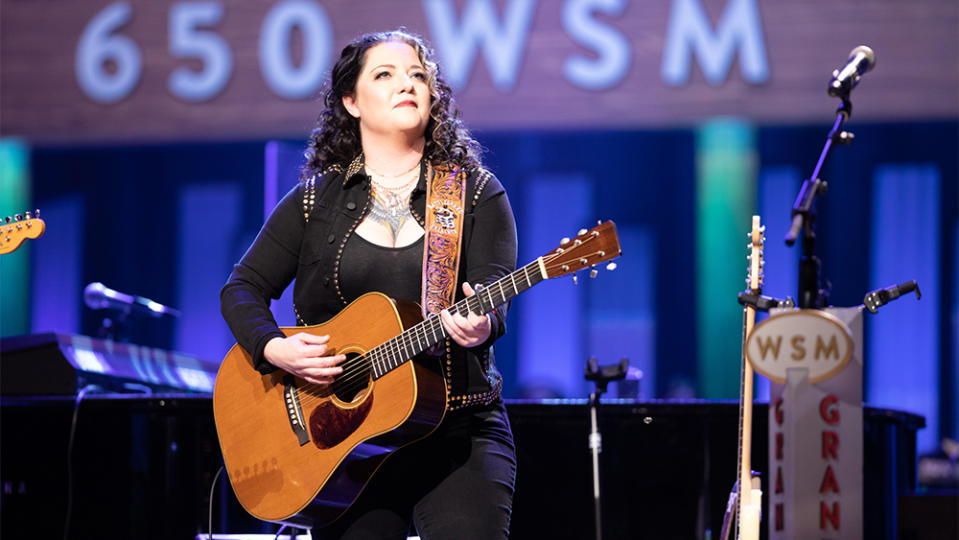
Courtesy of Chris Hollo / Hollo Photographic
McBryde is a big believer in upholding traditions, just for her own sake. “I’m sure everybody has their little rituals. There’s that big picture of Minnie Pearl back by the artists’ entrance, and she’s got her fingers laced and her palms are toward the floor and her elbows are locked and she’s smiling in the spotlight. It was one of my first favorite things about the building. So when I come in, I say, ‘Good evening, Minnie.’ Then when I leave, I say ‘Goodnight, Minnie.’ But there have been times where it’s almost time to get on stage and I’ve took off running down the hallway past security because I realized, I hadn’t said hello to Minnie. These girls can attest to it,” she laughs, looking at some of the others around the backstage area who’ve seen her sprint.
That portrait, she says, “has just got good juju on it.”
Jeannie Seely, a Reigning Queen of Old-School Country, Has One Word for the Grand Ole Opry: ‘Yes’
Jeannie Seely is living proof that, in country music circles, it’s possible to get hipper as you get older. At 81, she has her own SiriusXM show on Sunday nights and, between that and her frequent Opry appearances, this straight-talking live-wire is cherished by even some of the youngest country aficionados who value a touchstone that connects the genre’s glorious past to its present.
We’re meeting up in the Opry House dressing room that is named for the late Little Jimmy Dickens, and the stories she could tell about the days when the hang was right here, with Little Jimmy imbibing in the cocktails his wife wouldn’t allow at home. “I worked my way all the way up to Jimmy Dickens’ opening spot,” Seely says. “I’ve had some vocal issues because I have some esophagus issues, and I went to him and I said, ‘What do you do?’ He said, ‘Lower the keys and tell more bullshit.’”
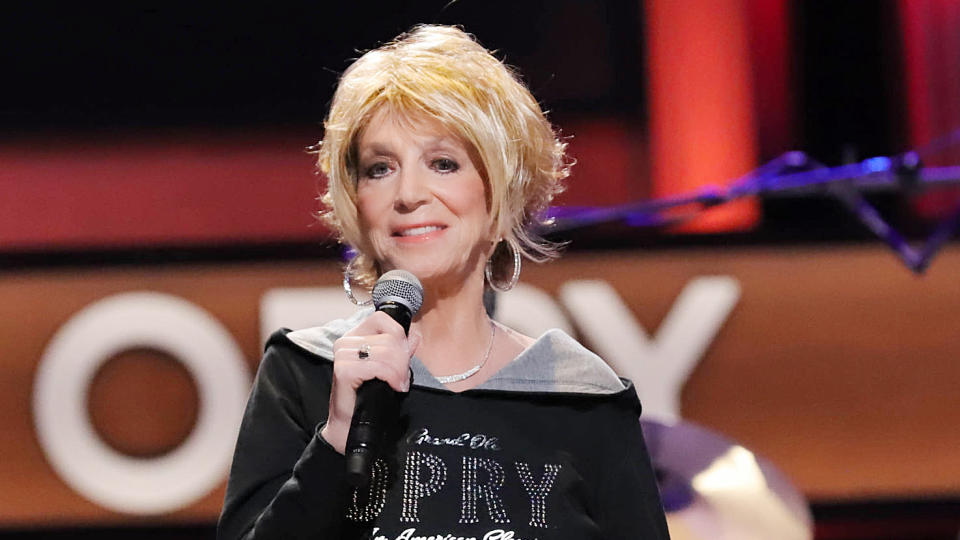
Courtesy of Bev Moser
She learned more from him as a teacher. “in my early years, I remember there was like Eddie Arnold, who was always a serious singer, and then there’d be a comedian. But it was Jimmy Dickens that was the first one that made me realize that you can do both — be a serious singer and also be funny — and that’s what I wanted to do.”
At the Opry, Seely says, there’s very little generation gap. “I try to always impress this on young artists that didn’t grow up on the Opry: It is not a normal concert venue. It’s not a normal show. There’s usually three generations represented on this stage, and you’ll see three generations in the audience, you don’t see that anywhere else. At sporting things, there might be in the crowd, but not on the field, you know? So I think that’s one thing that makes the Opry so unique.”
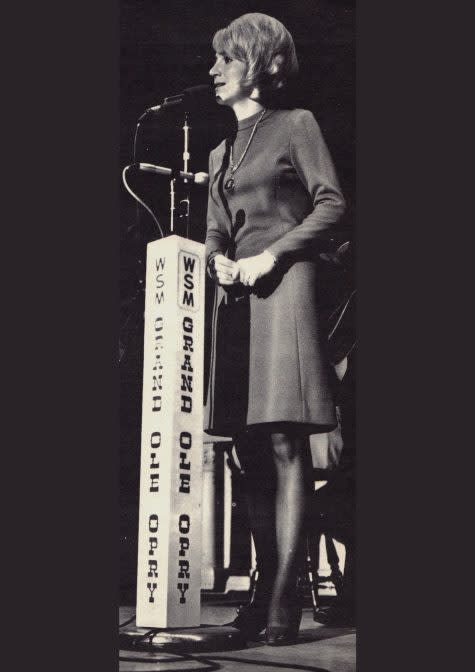
Courtesy Jeannie Seely
Seely isn’t sure how many Opry appearances she’s made. “Someone ran to the computer and it said something like 2,600, but I was a member for 30 years before we had computers, so we are trying to do some research.” She’s due for a lot more, and adores Dan Rogers and the other behind-the-scenes personalities as much as they do her. “I think they do an incredible job (booking lineups), and it is tough,” she says, maintaining a nightly balance of styles and demographics. Her style is to always welcome the chance to reappear.
“If the phone rings and I see it’s Dan, I never say ‘Hello.’ I just say, ‘Yes.’”
Grand Ole Opry’s Newest Member, Mandy Barnett, Is a Proud Tradition-Upholder
When Mandy Barnett was told while performing at the Grand Ole Opry on Sept. 28 that she would become the institution’s newest member, the invitation came from one of the Opry’s most longstanding veterans, Connie Smith, who was inducted in 1965. But Barnett can just about go toe-to-toe with Smith as an old soul. As someone who’s been performing at Opry shows for the last 27 years, Barnett (who starred in the long-running stage show “Always… Patsy Cline”) has been one of the under-50 crowd’s foremost standard-bearers for traditional country music.
Upon receiving the news from Smith, “It’s a wonder I didn’t just go backward,” says Barnett, who thought the Opry was going to make a big deal out of her birthday that night, not ask her to join the hallowed ranks. It was especially sweet getting the news from “Connie, just one of the greatest singers that ever lived, and such a sweetheart — she’s everything you want her to be.” But, she admits — as someone who was a regular guest of Porter Wagoner’s portion of the show, and beloved by the Opry’s elder statesmen — “it’s kind of a lonely feeling … I think part of what made me cry was thinking of how a lot of the people who were supportive of me aren’t around anymore to see it.” But, she also confesses, Opry membership had “just kind of been looming in my head for many years, as you could imagine. Now that I can start to think about some other things, I’m just tickled,” she laughs.
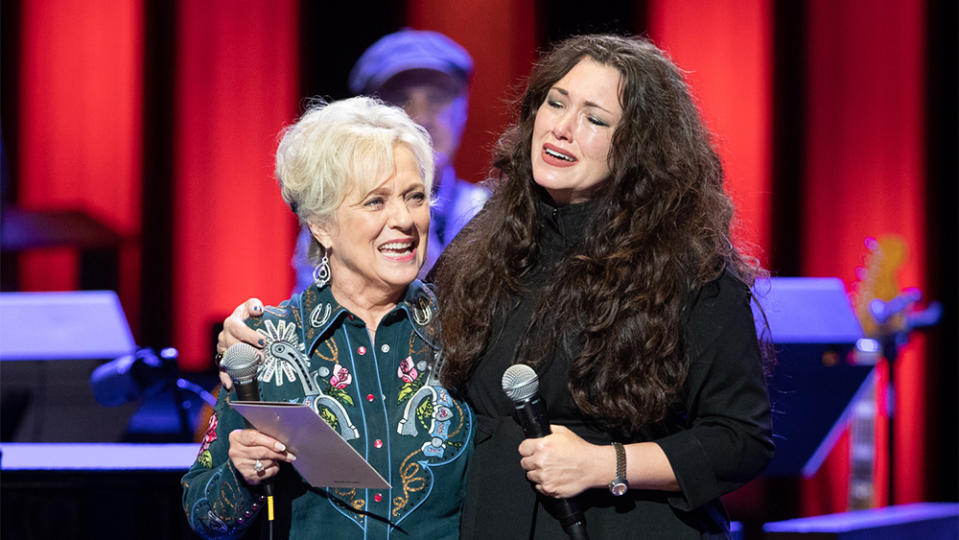
Courtesy of Chris Hollo / Hollo Photographic
Barnett is not all about honoring traditional country music. “One of my heroes is Linda Ronstadt, and she just had a lot of different influences, and I want to be able to explore those as well as I get older.” It was easy to see that influence coming to the fore when Barnett released a non-country album this year of Great American Songbook numbers, “Every Star Above,” a collection of tunes recorded by Billie Holiday which appeared mid-year on Variety critics’ ranking of “The 21 Best Albums of 2021 (So Far).” Prior to that, she made a much more contemporary album. “If you like real instruments that have an emotional component and a beautiful melody, I think there’s no reason why you shouldn’t be able to have a place in show business. I don’t think it has to be one thing. Americana certainly has made that point in the last 20 or so years. I can’t say that I’m necessarily an Americana artists, even though I made an Americana record two or three years ago, ‘Strange Conversation.’ I still consider myself a country artist, even though I’m not considered mainstream.”
Barnett hasn’t yet performed any of the Billie Holiday songs she covered at the Opry. She typically skews toward the Great American Nashville Songbook, and enjoys having a sense of duty to be someone who upholds a sense of legacy during her appearances. “I try to give them a Patsy Cline song or something that everyone knows — it’s not necessarily going to die, but these should be celebrated as much as the Great American Songbook. Hopefully I can be a reminder of the past. Because there’s room for everyone at the Opry. They do need to be able to appeal to a lot of different folks. And I think this current administration is really trying to do that; they grew up going to the Opry, people like Dan Rogers — they’re music fans.
“If you like country-rap or bro-country, that’s fine. It is difficult to try to maintain the past when you’re moving forward and making progress for young people. But there are so many great songs that should be sung and cherished for years to come. So if I can get up there and sing one that people haven’t heard in a while, and it brings back a good memory or makes them feel something, I’ve reached my goal.”
Best of Variety
Sign up for Variety’s Newsletter. For the latest news, follow us on Facebook, Twitter, and Instagram.


